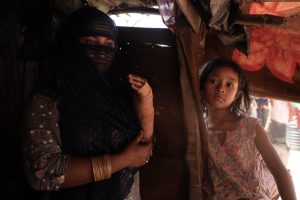Rohingya Muslims, who fled Myanmar to escape persecution by the Myanmar military, have found little security in India.
“I escaped from Myanmar and thought we would be safe here [in India],” said Zahoora Begum. “But there is no end to our miseries. We spend our days and nights in fear of detentions and attacks. We have grown up seeing miseries, but we never wanted our children to face the same.”
Zahoora, 25, lives in a makeshift camp at Kirana Talab area of Hindu-dominated Jammu in the Indian union territory of Jammu and Kashmir. She begins her day by feeding her brother’s three small children: Mohammed Ismail (9), Ismat Ara (8), and Noor Qayadani (3). The children’s parents were detained by police after a verification drive by authorities against Rohingya Muslims living in Jammu.
In March last year, over 170 Rohingya refugees were detained and taken to Hira Nagar jail in Jammu after they failed to provide valid documents. More than 150 refugees are currently imprisoned in the Hira Nagar jail.
“I feel pained to see my nephews wandering here and there,” Zahoora said, with tears in her eyes. “They keep asking me the same question. Where are our parents?”
To feed her brother’s children, Zahoora works as a laborer.
“I am worried about the future of these small children,” Zahoora said. Although she hopes that they “will be reunited with their parents someday,” “deep down there is a fear that is killing” her as she fears that her brother and sister-in-law “will be deported back to Myanmar.”
Ismat used to go to a nearby school. But after her parents were detained, she left school out of fear that she might be detained in the school. She now spends her whole day playing outside the shanty or helping her aunt in household chores.
“Our children’s education has suffered the most,” Zahoora said, pointing out that most Rohingya children dropped out of school to escape detentions.
“If they [the authorities] want to deport us back to Myanmar, it is better they kill us here at once rather than deporting us back to the country where we were persecuted, raped and killed,” she added.
With anti-Muslim sentiments in India gaining pace, Rohingya Muslims and their children not only fear detentions but also they are living in fear of attacks by Hindu right-wing groups. According to Human Rights Watch, there are an estimated 40,000 Rohingya refugees in India, with the majority of them living in makeshift camps in Jammu, Hyderabad, and New Delhi. Nearly 10,000 of these refugees live in shanties in Jammu.
On March 15 this year, Indian authorities deported Hasina Begum back to Myanmar. Her deportation had a huge impact on the Rohingya families in Jammu as she was separated from her husband and three small children. It was only early this year that her family was reunited at Cox’s Bazar in southeast Bangladesh, which is home to almost a million Rohingya refugees.
Fear of detentions and attacks is driving a growing number of Rohingya refugees to flee India.
Noor Alam, 60, has a family of seven and is uncertain about the future of his children. He wants to leave India and move to another, safer place with his family. But it would cost him 20,000 Indian rupees ($256) per person, which he cannot afford. He used to beg to be able to feed his family.
Alam dreams of a secure and bright future for his children. He wants to provide them with quality education and a better living standard. He has decided to save money and is hopeful that someday he will have enough money to move to a safer place. ‘’Nobody wants their children to suffer, nobody wants their children to be targeted for their identity,” he said.
“Whenever our children go out of the slum to play, they are chased away by other children. They are teased for being refugees and nobody plays with them,” Alam said. “My children often ask me why are we are treated like criminals. What is our fault?”
“I sometimes feel that our children live the life of prisoners where they don’t have the liberty to move out freely. They spend the whole day playing but only in the slum area and do not move out of it due to fear of being teased and detained,” added Alam.
Sixty-five-year-old Haseena Begum’s life is hard. Her son and daughter-in-law were detained over a year ago. Their children live with the old and ailing Haseena. “I am getting weaker by the day,” she said, wondering who will look after her grandchildren when she dies.
“The children want just a glimpse of their parents but jail authorities have denied them permission to meet their parents,” she said.
“The children need their parents and their pampering. But they are being robbed of their parent’s love,” Haseena continued, adding that she “feels pained to see them doing household chores.”
“I can’t work properly, I can’t lift heavy things, but they help me in every work. This is the time for them to study and play but they work like laborers in their own hut.”
Rohingya families living in Jammu want authorities to safeguard them and enable them to provide a better life for their children. “We are suffering from a long time and we don’t want our children to live in fear,” women refugees say, and if authorities want to deport them they should deport the entire family together. Separating children from their parents and family is painful and devastating, they point out.
“We had come here to live peacefully and wanted our children to be safe from what we faced back in Myanmar. Bur we are unlucky. Even moving away from Myanmar has not helped us and our children,” said Zahoora.













































